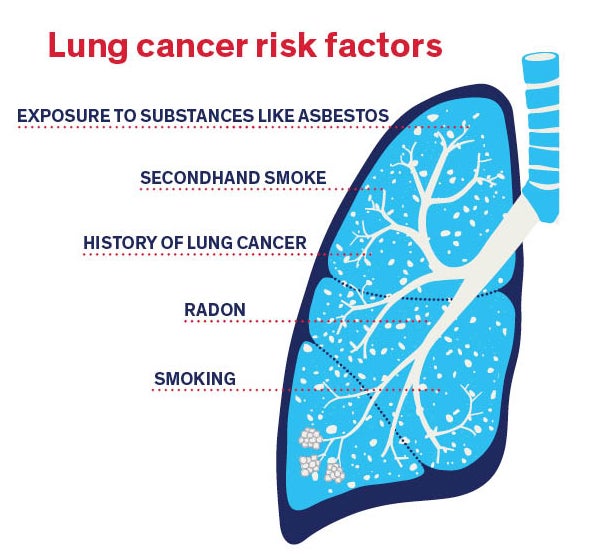Northern Illinois Lung Cancer Screening Project
Risks of radon exposure and lung cancer

Lung cancer is one of the most common cancers and has a higher mortality rate when compared to breast, colon and prostate cancers combined.
The diagnoses of early-stage lung cancer can improve the survival rate to 50 and 75%. Identifying lung cancer in the early stages increases the survival of lung cancer patients, hence low-dose computed tomography (LDCT) screening may play an important role for mitigating the high death toll of lung cancer.
The American Lung Association offers a CT lung cancer screening test and eligibility quiz, which lets people know if they should be screened for lung cancer.
Lung cancer is the leading cause of cancer death worldwide. About 8 million Americans are at high risk for lung cancer, but less than 6 percent will get screened using the best technology currently available, which is low-dose computed tomography (LDCT), a special type of CT scan that minimizes the amount of radiation used.
Dr. Puri received funding from the Community Foundation of Northern Illinois to explore the possibility of developing a molecular diagnostic tool for lung cancer and assess the impact of low-dose computed tomography (LDCT) screening on lung cancer patients in the Rockford community.
Encouraging at-risk people, such as chronic smokers and those in rural areas, to get LDCT can help the odds of detecting lung cancer in its earlier, more treatable stages.
Low-dose computed tomography (LDCT)
Low-dose computed tomography (LDCT) helps detects lung cancer even before they see signs and symptoms of the disease. The a survival rate can be up to 85% when the disease is detected early.
What you need to know
LDCT screening can show small abnormalities. Further testing may be needed to confirm if your results show lung cancer.
If you’re showing active signs and symptoms of lung cancer, including new and worsening cough, chest pain, coughing up blood, shortness of breath, wheezing or unexpected weight loss, you should not get an LDCT screening. Talk to your provider about further tests.
How to schedule a screening
If you, or someone you know, falls into one of these categories, talk to your primary care physician and ask them about an LDCT screening. Most insurance companies and Medicare will cover the cost of LDCT lung cancer screenings without a co-pay.
About the program
Neelu Puri, PhD, is an associate professor in the Department of Biomedical Sciences, whose research has focused on biomarkers for treatment and detection of lung cancer. She conducts research with students in the UICOMR Master of Science in Medical Biotechnology Program and medical students.